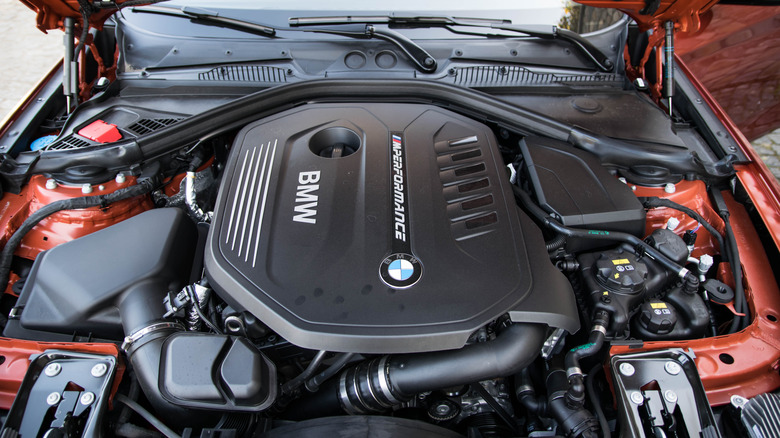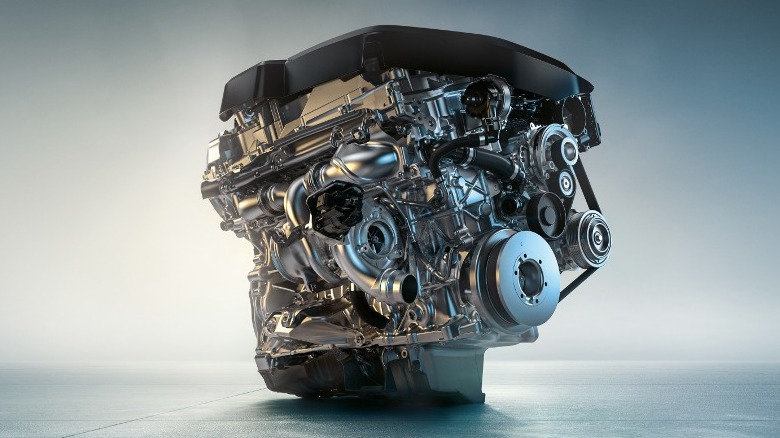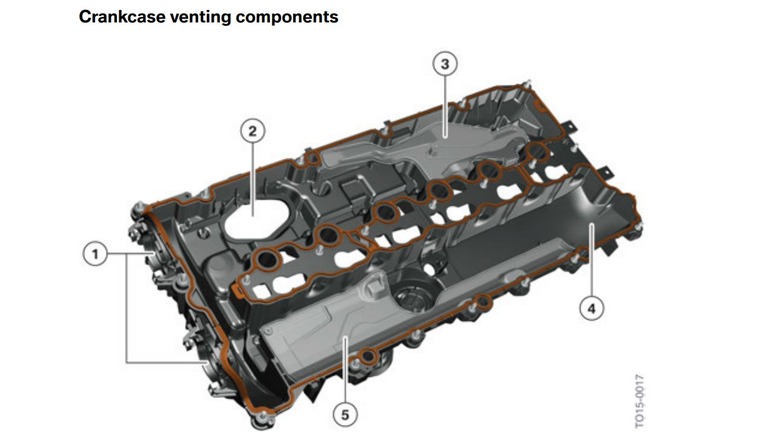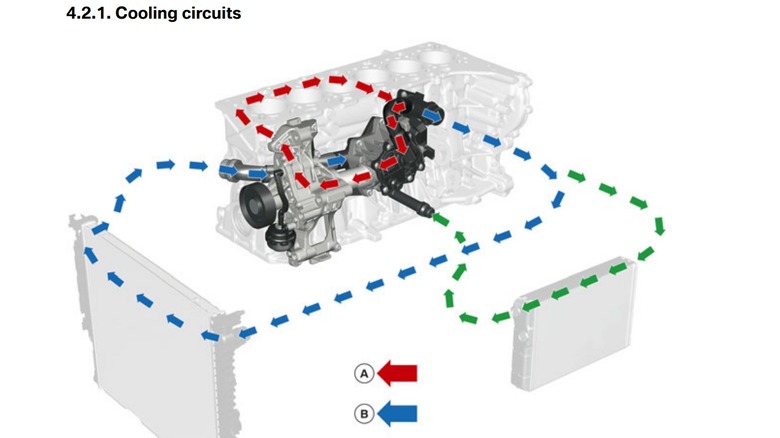How Reliable Are BMW's B58 Engines? Here's What Owners Have To Say
BMW's B58 turbocharged inline-six engine is the result of a lot of experimentation, failure, and gained knowledge. In the mid-2000s, BMW decided to take turbocharging mainstream, initially on its performance engines. The resulting N54 twin-turbo straight-six and N63 twin-turbo V8 made a mess of it, specifically in the reliability department. Despite providing impressive performance, both engines were notoriously troublesome in their earlier forms, tainting the reputation of BMW's turbocharged engines as a result. After countless customer complaints and a number of technical service bulletins, BMW slowly began righting its wrongs. The N55 turbo inline-six that succeeded the N54 was marginally more dependable and the N63 has been majorly reworked three times to improve its performance and reliability.
It wasn't until 2015 that BMW built a new turbocharged engine that could truly be considered reliable. The BMW B58 turbocharged inline-six was released as a part of a fresh modular turbocharged engine series that also included the B48 four-cylinder and B38 three-cylinder. The BMW B58 has been refined multiple times over its production life, receiving two technical updates that improved its design and increased its performance. Over nearly a decade in service under the hoods of multiple BMW cars and even the Toyota Supra, the B58 has proven itself to be very capable, versatile, and one of the most reliable BMW engines ever built in the eyes of many. Despite its widespread acclaim, some B58 owners have experienced reliability issues ranging from pressure control valve failure to excessive coolant loss.
The BMW B58 has been refined and updated over the years
BMW has a long history of introducing "technical updates" for engines during their production lives. In some cases, the technical update versions feature revisions to improve power and efficiency, and in others, they are implemented to fix reliability issues. While the initial B58 was a very capable and celebrated engine, BMW decided to refine it further. With the BMW B58 nearing its tenth birthday, it has already received two technical updates.
The B58TU1 was introduced for the 2019 model year and split the engine into two distinct performance classes. There was a middle output (ML) variant that produced 340 horsepower and an upper level (OL) variant that generated between 374 and 388 horsepower. In addition to the performance bump, the B58TU1 introduced some substantial hardware changes. The most critical updates included a redesigned one-piece timing chain arrangement, a massive increase in direct-injection fuel pressure, and an upgraded cooling system. Lower output versions of the B58TU1 also featured a new top-end design, which integrated the exhaust manifold and turbocharger into the cylinder head for improved thermal management and weight reduction.
Three years after the B58TU1 found its way under the hoods of many cars in the BMW fleet, the engine was reworked yet again. The B58TU2 arrived on the scene in 2022 and offered some dramatic changes to the formula. Its intake ports and combustion chambers were redesigned to take advantage of the Miller cycle for improved efficiency. It also received electronic Vanos variable camshaft timing, a new ignition system, an optimized turbocharger, and a dual port-injection/direct-injection fuel system. Arguablyhttps://f30.bimmerpost.com/forums/showthread.php?t=1566946 the B58TU2's biggest advancement was the inclusion of a 48-volt mild-hybrid system that regenerated charge under braking.
The BMW B58 is a reliable engine with only a couple of notable problems
In its ten years as BMW's mainstay inline-six offering, the BMW B58 has not only gained positive critical reception but also adoration from owners around the world. In total, the B58 has received a Wards Best 10 Engines award four times. Those awards came in 2016, 2017, 2019, and 2020, two for the initial B58 and two for the updated B58TU1. In a Bimmerpost thread discussing the reliability of the engine, 22 of 24 of the owners who posted reported having no issues with their engine at all in a mileage bracket between 13,000 and 89,000 miles. The experience of owner and forum member D's Bimmer accurately captures the sentiment in the thread, saying, "I have 89k on my 2016 340ix 6SP. I drive it hard and frankly haven't had a single issue with the car at all."
Despite the largely positive reception from critics and owners alike, there are two sides to every coin. In 2016, BMW released a technical service bulletin that outlined a problem with premature crankshaft guide bearing wear on some B58-equipped 3-Series that featured a manual transmission built between July 2015 and November 2015. Luckily, the issue only affected 45 U.S. vehicles, and there is a lack of owner complaints about the issue online. That isn't the case for other B58 issues, though, with PCV problems and coolant loss affecting a large number of engines and remaining common topics of conversation in the B58 community.
The B58 is known to have a problematic PCV system
One of the most widely discussed engine problems in the B58 community revolves around faulty crankcase pressure control valves, which affected a large number of BMW models between 2017 and 2021. In a technical service bulletin released in 2023, BMW stated that the rubber diaphragm responsible for oil separation in the PCV system could rupture or tear, leading to blue or white smoke billowing out of the exhaust system or a loud whistling sound coming from the engine compartment.
While the issue can be repaired easily on early B58 engines, the PCV diaphragm is built into the valve cover on B58TU1 engines, requiring the entire valve cover to be replaced. Owner ErkanTR16 discussed their experience with B58 PCV failure on the Bimmerpost forum, saying, "I went in for an oil change and the dealer noticed smoke and oil coming from the exhaust. They said the valve cover and the oil separator needed to be changed." Erkan went on to explain that the repair would have ended up costing $2,544 if the parts and labor weren't covered by the dealership under a goodwill agreement. With early B58 BMWs now out of their four-year, 50,000-mile powertrain warranty, a PCV diaphragm failure is a potentially costly repair.
Coolant loss is another common issue
Another common issue faced by B58 owners is coolant loss, specifically from the low-temperature cooling system. In a 2016 poll conducted on the Bimmerpost forum, 63 percent of 228 voters who owned a B58 claimed that their engine consumed or leaked coolant. That's a pretty serious problem, as running an engine with low coolant can cause a number of major engine issues caused by overheating.
Owners have speculated about a number of potential causes for the B58's coolant loss issue, but BMW has only officially acknowledged a single cause in a technical service bulletin. In the bulletin (PDF) released in 2020, BMW claimed that the problem was caused by a premature breakdown of coolant in the low-pressure cooling system. Other BMW resources, including Bimmers.com, point to a faulty coolant cap, turbocharger leaks, or coolant reservoir leaks as other potential causes of B58 coolant loss.
Another common cause talked about frequently by B58 owners is the engine's water pump design, which features a weep hole facing the ground. A number of owners on popular BMW forums have mentioned that their coolant leak was caused by the water pump design, with user Burr001 saying, "My water pump also developed a leak from the weep hole. I never noticed it and it got worse over time. When my coolant low warning kicked on, I dove deeper into the engine bay and saw the white dried residue of the coolant. I replaced the pump at 39,000 miles."




